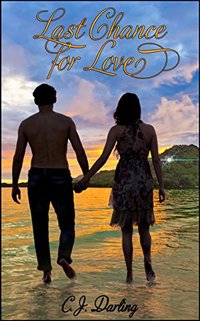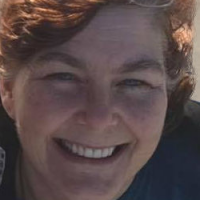C.J. Darling Interview Published on: 09, Mar 2018
 Growing up on a farm, what were some of your chores as a kid?
Growing up on a farm, what were some of your chores as a kid?
Mostly my chores included cleaning out the horse stables and the kennels. When I got older, I also had to mow the grass in the upper pastures and around the house.
How did you spend most of your free time?I spent most of my free time playing outside, climbing trees, and fishing in the creek that ran below our farm. I wasn't allowed to watch shows like "Star Trek," but of course I did whenever I could manage it. I used to have great adventures exploring alien planets with my imaginary crewmates and friends.
Do you remember the first book you ever read or was ever read to you? What was one piece of literature that spoke to you and made you realise that language had power?I've been reading everything I can get my hands on ever since I learned to read in kindergarten, and I honestly don't remember the books I read in those early years. The first one I really remember speaking to me was a very dog-eared copy of Mary Stewart's "The Hollow Hills" that I found at a garage sale. I must have been about 12 at the time. I was instantly hooked, and became an ardent Arthurian fan. My interest in medieval history led me to write several medieval romance novels and, from there, to begin writing modern-day romances, mystery/intrigue, and over 200 short stories under various pen names.
If you weren't an author, what would be your dream career?My other ambition was to be a lead or backup singer in a band. I actually did this for several years before having my first child, but writing has always been my first passion.
Do ideas for books usually pop into your head unannounced at random moments or do you have to sit down and think about it?I think most authors will tell you they daydream or mentally roleplay whenever their minds aren't otherwise occupied. That's certainly true for me. I'm constantly envisioning scenes in my mind, and working on conversations between two likely characters. When a scene or a conversation clicks, I start jotting down notes and focusing more on those characters, fleshing out their backgrounds and personalities, then start imagining what kind of adventures they could have. From there, the book generally creates itself.
How did you come up with the idea for "Deadly Divergence"?"Deadly Divergence" was actually inspired by "The X-Files." I wrote an entire novel that picked up where the original nine-season series ended, wrapped up a ton of loose threads, and took the myth-arc in a new direction. It was very well received by series fans, but despite nearly three years of trying, I never could get Chris Carter to look at it. (He likes to troll the conspiracy newsfeeds and come up with his own ideas; he very rarely accepts ideas from anyone else.) Eventually I gave up trying to get his seal of approval, and rewrote the characters and the entire storyline so it became completely my own book, not a continuation of his series. The title comes from Mac's and Conners' discovery that the island's glowing spores have diverged from other Terran lifeforms, and have become a powerful and potentially deadly sentient species totally separate from humanity.
How much research went into the making of "Deadly Divergence" so that the "science" behind it seemed believable and real?A lot, and nearly all the science mentioned is real and already exists. I researched everything from volcanic islands and phreatic explosions to deep-sea thermophiles (bizarre microorganisms that live near underwater volcanic vents). I spent months trying to get a restricted manual with blueprints of the U.S.S. Kennedy...and when I was finally granted access, I found that several key pages had been torn out. That was very frustrating. I researched how wild dolphins interact with humans, just in case my characters interacted with any, and watched Tom Hanks' "CastAway" dozens of times to get a better feel for how shipwreck survivors could survive on a remote tropical island. I also studied astronomy manuals to learn which stars would be visible at the far southeastern point of the Bermuda Triangle, researched tide current websites to learn how their raft should travel (but didn't) once the plane crashed, and I interviewed a retired Marine to learn how a scout-sniper "fire team" would realistically canvass an island searching for criminals.
What's the craziest thing you've ever done or learned while researching?That's a tough question, because I've researched so many different topics over the years. I think it would have to be cliff-climbing in Ireland while I was researching the final scenes for "Dangerous Secrets." I'm very afraid of heights, but I found myself scrambling up and down very steep rocky hillsides near the Cliffs of Moher, and spelunking, which I thoroughly enjoy. I'd never realized Ireland has so many amazing cave systems. It was a wonderful experience I can't wait to repeat.
What are you most proud of about the book "Dangerous Secrets"?I don't think I can point to one specific thing I'm most proud of; I'm proud of the entire thing. My graphic artist, Linda Cappel, is one of the best around, and she did a fantastic job on the cover. The story itself is one of my personal favorites because of its strong ties to Ireland.
Was Hollywood superstar Conor Fitzpatrick modeled after any real life Hollywood celebrity?Two words: Pierce Brosnan. LOL "Remington Steele" has always been one of my favorite TV shows, and Conor is very definitely modeled after his character in that show. Conor's mentor, Ryan Worthington, looks like Pierce Brosnan now--with Sean Connery's magnificent voice.
How often do you write daily?I'm also a book publisher, so the sad truth is I rarely have time to work on my own books. If I'm lucky, I can devote a few hours a week to my own writing. I'm hoping that will change soon.
What's the longest you've ever written without any breaks?Shortly after the original "Stargate" movie was released, I wrote a screenplay for a sequel titled "Stargate: Revisited." I wrote 139 pages' worth of screenplay in six days. That was a new record for me, and I was so burned out afterwards that I couldn't write at all for six months. Dreamworks reviewed my screenplay, but eventually decided to pass because Richard Dean Anderson's TV series was already in the planning stages.
Besides being a talented author, what are some other hobbies you have?I'm a freelance photographer, and I will always continue to love music even though I don't play anymore. At one time I was an Irish stepdancer until I was sidelined by dance injuries, and that remains another deep love. I also love bicycling with my brother.
Are you signed to a publishing house?I run my own indie publishing company, Boruma Publishing, but I wouldn't be averse to publishing with a Big Six firm. The ultimate goal, after all, is to impact readers...and that's more likely to happen if a Big Six firm is publishing and promoting books on your behalf.
What is your stance on the traditional publishing vs. self-publishing debacle?As the saying goes, "The good thing about indie publishing is that anyone can publish a book...but the bad thing about indie publishing is that anyone can publish a book."
In times past, traditional publishers proofed and/or edited their authors' manuscripts before they went to print. That no longer seems to be the case, and now Big Six firms are releasing books filled with typos and amateurish typesetting. It's really sad.
Unfortunately most indie authors are even worse; far too many don't bother to edit or even re-read what they've written. The result is poorly written books that are often barely understandable. "Debacle" is the right word for those books, and the sad fact is they greatly outnumber well-written indie books that tell a good story. That gives a very bad impression of all indie writers in general, and I think is largely responsible for the decline we're seeing in indie book sales.
What kind of change do you hope to bring with your books?A change to my bank account would be a nice start. ;-) Beyond that...every author has a story to tell, and the purpose of that story is to impact a reader's imagination and emotions. Whether the story is happy, sappy, suspenseful, intriguing, or a real tear-jerker, authors want to make their readers feel what they felt when they wrote the book. They want to offer their readers a brief escape from their current reality, and take them on a journey of adventure. If my readers catch their breath when something unexpected happens to my characters, the stories make them laugh or cry, and they finish the last page with a smile, I'll know I've done a good job.
What were some of your biggest fears as a new author and how did you manage to get over them?Back when I started publishing, long before indie publishing took hold, the only option available was to engage an agent's interest, and that was very difficult. I got dozens of rejection slips, and I remember being depressed for days whenever a new one arrived. Even worse, some agents who claimed they were accepting new manuscripts didn't even bother to open my envelope; they just stamped it "Rejected" and sent it back without ever looking at what I'd sent. That was incredibly discouraging. Rejection isn't easy for anyone to deal with, and there were times I struggled with the decision to keep trying. My husband was very supportive, and I think that's the major reason I didn't give up completely.
Now, when anyone can create an account at dozens of major and minor websites, and submit whatever they want without ever needing an agent, I suppose the great fear is not making any sales on the book you've (hopefully) worked so hard to write. That's another kind of rejection, and it can be painful and frustrating. The only advice I can offer is just to keep trying, and promote it in every way you can. Sooner or later someone will find your book, enjoy it, and recommend it to a friend. That's how it all begins.
Share C.J. Darling's interview
Author C. J. Darling became hooked on medieval history and romance after reading Mary Stewart's "The Hollow Hills" as a child. She also loves freelance photography, music, dancing, and bicycling with her brother. Because she also owns an indie publishing company, Boruma Publishing, C.J. rarely has time to work on her own books, but she tries to devote a few hours a week to her own writing. Like other authors, her goal is to make readers feel what she felt when she wrote the book, whether it makes them laugh or cry. Her advice to authors dealing with or afraid of rejection is to keep trying and promoting; if you're patient and persistent, readers will find and enjoy your book.
 Deadly Divergence
Genre: Supernatural Suspense, Action & Adventure, Contemporary Romance, Paranormal Romance, Romance, Science Fiction
Deadly Divergence
Genre: Supernatural Suspense, Action & Adventure, Contemporary Romance, Paranormal Romance, Romance, Science Fiction
 Last Chance For Love
Genre: Contemporary Romance, Paranormal Romance, Romance, Erotic Romance, Women's Fiction
Last Chance For Love
Genre: Contemporary Romance, Paranormal Romance, Romance, Erotic Romance, Women's Fiction
 Dangerous Secrets
Genre: Contemporary Romance, Romantic Suspense, Paranormal Romance, Romance, Erotic Romance
Dangerous Secrets
Genre: Contemporary Romance, Romantic Suspense, Paranormal Romance, Romance, Erotic Romance


